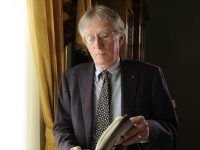October 1, 2014
Edited by David Sanders
Specimen Days
1842 – Charles Cros, French mathematician/chemist/poet (Le Hareng Saur), is born.
1885 – Louis Untermeyer, NYC, poet/critic (Immortal Poems, Story Poems), is born.
1917 – René A de Rooy, Suriname/Antillian poet (Juancho Picaflor), is born.
1953 – John Hegley, British poet, is born.
1966 – Albert P A A Besnard, poet/journalist (Doom & Thirst), dies.

Friendship in the Mendip Hills
Even though I went
to the trouble of putting up your tent
for you,
it was fine
that you spent
all of your time
in mine.
— John Hegley (1953– )
Even though I went
to the trouble of putting up your tent
for you,
it was fine
that you spent
all of your time
in mine.
— John Hegley (1953– )
World Poetry
The Turmoil In Scotland, Expressed By Its Poets
Been an awful lot of punditry in speeches over the past few weeks in the U.K. as the Scottish independence referendum has unfolded – victory speeches, campaign speeches, concession speeches, resignation speeches. As they say in Scotland, oy, enough. Today we give the microphone to Scotland's poets. NPR's Ari Shapiro reports from Edinburgh. More.
Tchernichovsky Sparks Currency Row

PM’s brother-in-law calls for boycott of 50 shekel note featuring poet who intermarried
Several religious figures have criticized the Bank of Israel’s decision to feature renowned Hebrew poet Shaul Tchernichovsky on newly minted NIS 50 notes, citing his marriage to a Christian woman. Dr. Hagai Ben-Artzi, brother of Prime Minister Benjamin Netanyahu’s wife Sara, said last week that the use of the Russian-born poet’s image on the bill was “an outrage.” More.
Ukrainian War Sparks Poetry Protest

Poetry is power. Behind the lyric language and the rhythm sometimes lurks a punch. From Springfield, Mike Mheidze looks to his home country of Russia and can feel the power of poetry. Mike was born and raised in Soviet Georgia, eventually moving to Moscow. He has lived in Springfield for more than 20 years and became an American citizen in the late 1990s. He does not like what he sees as his native country’s intervention and annexation of a portion of Ukraine. He is doing something about it, and it has to do with poetry. More.
The Bank of Israel’s newly minted 50 shekel notes, featuring Hebrew poet Shaul Tchernichovsky, cause a controversy.
Recent Reviews
Acquainted With the Dark

by Peter Campion
“Toward his critics,” Louise Glück wrote in one of her best essays, “the artist harbors a defensive ace: knowledge that the future will erase the present.” That may sound peculiar coming from Glück. It’s tough to imagine that a poet as distinctive and restless as she is would trust much in her champions, much less her critics. What’s more, she might seem an unlikely celebrant of the future. Few living poets have dwelt as successfully on the past. Often employing the idioms of depth psychology — the analytic koans, the mythic analogies — she tends to approach her narratives of familial and erotic love from this side of their endings, and with more than a touch of fatalism. More.
“Toward his critics, the artist harbors a defensive ace: knowledge that the future will erase the present.”
— Louise Gluck
Broadsides
Mixed Signals: Responses to Daniel Tiffany
Daniel Tiffany’s “Cheap Signaling,” with its provocative argument about class conflict and poetic diction, ignited conversation on- and offline. Its case for the relevance of the logics and under-histories of kitsch, and its reframing of vernaculars in some contemporary poetry, led readers to admire Tiffany’s innovative synthesis but also to question inclusions and omissions. Some applauded the revitalization of terms of class oppositionality in poetry, while others challenged troublesome figurations they felt didn’t account for the verities of economic class, or of race or gender. More.
I Tried to Make a Search Engine Write Me a Poem
by Anna North
Before I started writing this, I took a creativity test. Many different such tests exist, but I took one of the best-known ones: Guilford’s Alternative Uses Task, which simply requires that you come up with as many applications for a particular object as possible. I picked a paper coffee cup. After 10 minutes (an amount of time I’d arbitrarily chosen), I had 39 uses, from the prosaic (“hold coffee”) to the probably impractical (“poke holes in the bottom and it could be a shower head for a short amount of time before it collapses”). More.
Why Are These Funders Giving Millions for Youth Slam Poetry?
by Kiersten Marek
If you've ever been to a poetry slam, which are everywhere these days, you know it takes gumption to get up on stage and do your thing, and all the more so if you're a teenager. These are venues where young people bare their souls and, along the way, can truly find their voice. The empowering nature of slamming, and the ways that empowerment can translate into other spheres of life, explain why a group of funders are putting up some $10 million over the next seven years to support nonprofits that work with teenagers in writing and performance. More.
Over the next seven years, $10 million dollars will be donated to nonprofits that work with teenagers in writing and performance.
Drafts & Fragments
Henri Matisse Illustrates Baudelaire’s Censored Poetry Collection, Les Fleurs du Mal

We previously featured Henri Matisse’s illustrations for a 1935 edition of James Joyce’s Ulysses. If the Odyssey-themed etchings he did for that book surprised you, have a look at his illustrations for Charles Baudelaire’s poetry collection Les Fleurs du mal, first published in 1857. More.
Jayne Mansfield Reads the Poetry of Shakespeare, Shelley, Browning and Others
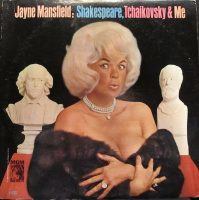
Shakespeare, Tchaikovsky & Me, Jayne Mansfield’s delicious album from 1963 or 1964 (depending on where you look), has never seen a CD release and it’s not available on the music streaming services I consulted. That scarcity has driven up the price: right now you can get a copy from Amazon.com for $60 and up. More.
Check out Henri Matisse’s illustrations for Baudelaire’s censored poetry collection, Les Fleurs du Mal.
Poetry In the News
This Young Mother’s Poem about Her Vanishing Country Stunned the World’s Leaders

Of the dozens of speeches by world leaders, advocates, and movie starsat the UN climate summit on Tuesday, none garnered as strong a reaction as that of the poet Kathy Jetnil-Kijiner. The 26-year-old from the Marshall Islands, a tiny Pacific nation, recited a poem she wrote for her 7-month-old daughter. To a hushed audience, she told of a homeland under grave threat from a rising ocean: “We look at our children and wonder how they will know themselves or their culture, should they lose our islands.” More.
Epilepsy Drug Makes Woman Write Poetry Non-Stop
A 76-year-old woman with epilepsy found that her medication not only helped her seizures but also made her write beautiful poetry. The condition is called hypergraphia and can often result in jumbled, nonsensical words. The woman went to the hospital last year. She was complaining about memory loss and a tendency to lose her way in familiar locations. She also suffered from seizures, according to the journal Neurocase. More.
Pitt Poet Wins More Than Half a Million, Named a Genius

Terrance Hayes has come a long way from being a starving artist. He is now considered a genius. Last week, the John D. and Catherine T. MacArthur Foundation announced its 2014 class of fellows to receive a MacArthur grant. Hayes, a nationally recognized poet and professor at Pitt, was among the 21 selected. More.
Kathy Jetnil-Kijner stunned the world’s leaders at the UN climate summit with her poem written for her 7-month-old daughter.
New Books
Citizen: An American Lyric by Claudia Rankine
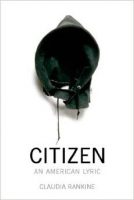
[Paperback] Graywolf Press, 160 pp., $20.00
Claudia Rankine’s bold new book recounts mounting racial aggressions in ongoing encounters in twenty-first-century daily life and in the media. Some of these encounters are slights, seeming slips of the tongue, and some are intentional offensives in the classroom, at the supermarket, at home, on the tennis court with Serena Williams and the soccer field with Zinedine Zidane, online, on TV—everywhere, all the time. The accumulative stresses come to bear on a person’s ability to speak, perform, and stay alive. Our addressability is tied to the state of our belonging, Rankine argues, as are our assumptions and expectations of citizenship. In essay, image, and poetry, Citizen is a powerful testament to the individual and collective effects of racism in our contemporary, often named “post-race” society.
Brain Fever: Poems by Kimiko Hahn
[Hardcover] W. W. Norton & Company, 144 pp., $26.95
Rooted in traditional Japanese aesthetics and meditations on contemporary neuroscience, a stunning new volume from an essential American poet. Acclaimed as "one of the most fascinating female poets of our time" (BOMB), Kimiko Hahn is a shape-shifter, a poet who seeks novel forms for her utterly original subject matter and "stands as a welcome voice of experimentation and passion" (Bloomsbury Review). InBrain Fever, Hahn integrates the recent findings of science, ancient Japanese aesthetics, and observations from her life as a woman, wife, mother, daughter, and artist.
Missing the Moon by Bin Ramke
[Paperback] Omnidawn, 120 pp., $17.95
Attempts to reach the moon, metaphorically and otherwise, are an ancient element of human imagination. With intrusions from mathematics and science, these poems are elegiac celebrations of various ambitions that miss the mark, but matter anyway. The poems sometimes center on events in the life of the poet or members of his family; sometimes on the geography, geology, and the histories accrued by local communities, human and otherwise; sometimes they center on historical figures reimagined—from Giacinto Scelsi to Alan Turing. But these poems are always about boundaries and barriers, crossed sometimes, ignored at peril. They are about distances that must be travelled.
Vermeer in Hell: Poems by Michael White
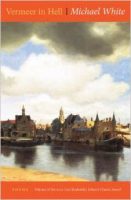
[Paperback] Persea, 80 pp., $15.95
Through the paintings of Vermeer, Michael White explores new landscapes and transforms familiar ones in this extraordinary new collection of poems. Through the paintings of Vermeer, Michael White explores new landscapes and transforms familiar ones in this extraordinary new collection of poems. This captivating masterwork transports us across eras and continents, from Confederate lynchings to the bombing of Dresden, through its lyrical inhabitations of some of Vermeer’s most revered paintings, each one magically described and renewed. More than mere ekphrasis, Michael White explores the transformative possibilities of great art in his fourth collection, winner of the 2013 Lexi Rudnitsky Editor’s Choice Award.
Shadow of a Cloud but No Cloud by Killarney Clary
[Paperback] University Of Chicago Press, 88 pp., $18.00
Shadow of a Cloud but No Cloud, the latest collection from enigmatic prose poet Killarney Clary, is a book-length sequence of unnumbered, untitled poems, each evoking a clear moment in time. The details on which Clary chooses to focus suggest a narrative that will not resolve. The unnamed people with whom she interacts offer exchanges she is desperate to prolong, and in attempts to understand her place, she reaches beneath the fragile armor of those loved, especially those who can no longer answer her. This quietly haunting book, remarkable for its subtlety and delicacy, is Clary’s strongest, most engaging work to date and amply shows her to be a master of this lyric genre.
Digest by Gregory Pardlo

[Paperback] Four Way, 84 pp., $15.95
From Epicurus to Sam Cook, the Daily News to Roots, Digest draws from the present and the past to form an intellectual, American identity. In poems that forge their own styles and strategies, we experience dialogues between the written word and other art forms. Within this dialogue we hear Ben Jonson, we meet police K-9s, and we find children negotiating a sense of the world through a father’s eyes and through their own.
Claudia Rankine’s bold new book recounts mounting racial aggressions in ongoing encounters in twenty-first-century daily life and in the media.
Correspondences
The New Poet Laureate: 'Keep your mouth half-shut'
by Susan Page
Poet Charles Wright, 79, delivered his inaugural reading at the Library of Congress Thursday night, launching his year as U.S. poet laureate. He was appointed to the loosely defined position by Librarian of Congress James Billington. Born in Pickwick Dam, Tenn., Wright, a retired professor at the University of Virginia, has won about every honor given to poets, from the Pulitzer Prize to the National Book Award. Questions and answers have been edited for length and clarity.
Q: Some of your predecessors as poet laureate have pushed projects during their one-year tenure. Do you have a plan? More.
Carol Ann Duffy On Five Years As Poet Laureate: 'It has been a joy'

by Nicholas Wroe
When Carol Ann Duffy was appointed poet laureate in 2009, the first woman to hold the post in its nearly 350-year history, she set herself several goals that included setting up new prizes, giving support to new festivals and helping to generate commissions for poets. But she had only one goal for herself as a practising poet. "I wanted to continue to write as I always had, and I have tried very hard not to write a poem I previously wouldn't have written. More.
January Gill O’Neil in Conversation with Alison Meyers, Executive Director of Cave Canem Foundation
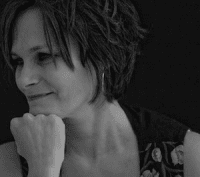
JGO: Cave Canem was formed in 1996. What was the inspiration for creating “a home for black poetry?”
AM: Toi Derricotte and Cornelius Eady recognized that African American poets were profoundly under-represented in the literary canon, academia, workshops, the world of publishing and literary awards, and elsewhere. Though the Dark Room Collective, founded in 1988, made a historic impact, in 1996, most African American poets were still writing in isolation. More.
Poet Returns to Her Roots in Pittsburgh after 26 Years

by Marylynne Pitz
While suffering through algebra class at age 13, Pittsburgh native Lucie Brock-Broido decided to become a poet. So, early in the 1970s, she quit Allderdice High School and enrolled in the Youth Learning Center, which was located in an Oakland church. “I went to that school for several years and just completely did theater and poetry. It was for kids who just couldn’t feel right in such a big, sprawling inner city school,” Ms. Brock-Broido said during a telephone interview. She also joined the Pittsburgh Laboratory Theater. Now director of Columbia University’s poetry program and the author of four acclaimed books of poems, she grew up in a tiny duplex on Forbes Avenue in Squirrel Hill. A principal at Allderdice allowed her to return to that school, where she graduated in 1974. She has taught at Bennington, Princeton and Harvard. More.
Patricia Lockwood and Michael Robbins Discuss Their Latest Poetry

In early 2013, I wrote to my editor at Penguin, the legendary Paul Slovak, and asked if he'd take a look at my friend Patricia Lockwood's new poetry manuscript. Her debut, "Balloon Pop Outlaw Black" (Octopus, 2012), had been a small-press best-seller. But "Motherland Fatherland Homelandsexuals," which Penguin published in May, is something else again, a swarming hive-mind of dunks and arches and hornets and cheerleaders and dominatrices and questions and lizards and "the probly and the prolly and the loblolly pines." Tricia and I spoke recently about the success of her new book, my forthcoming second book of poems ("The Second Sex," out Tuesday), and our current projects. What follows has been condensed and sanitized for publication in a respectable paper. More.
Carles Wright delivered his inaugural reading at the Library of Congress, launching his year as U.S. poet laureate.
Envoi: Editor’s Notes
Lessons from the Past: W. H. Auden
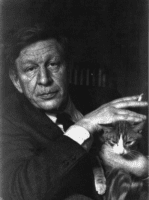
". . . until recently, men knew and cared little about cultures far removed from their own in time or space; by human nature, they meant the kind of behavior exhibited in their own culture. Anthropology and archaeology have destroyed this provincial notion: we know that human nature is so plastic that it can exhibit varieties of behavior which, in the animal kingdom, could only be exhibited by different species.
The artist, therefore, no longer has any assurance, when he makes something, that even the next generation will find it enjoyable or comprehensible.
He cannot help desiring an immediate success, with all the danger to his integrity which that implies."
—from "The Poet and the City"
The artist, therefore, no longer has any assurance, when he makes something, that even the next generation will find it enjoyable or comprehensible.
He cannot help desiring an immediate success, with all the danger to his integrity which that implies.”
–W. H. Auden, from “The Poet and the City”
